|
Air pollution is most acute in cities, but the problem
in rural areas is worse than many think [AP] Nine out
of 10 people globally live in places with poor air quality,
the World Health Organization (WHO) has said, blaming
a worldwide air pollution crisis for being a major factor
in millions of deaths per year.In a new report released
on Tuesday, the health agency said 92 percent of people
live in areas where air quality exceeds WHO limits.It
also published an interactive map detailing the global "health
emergency".
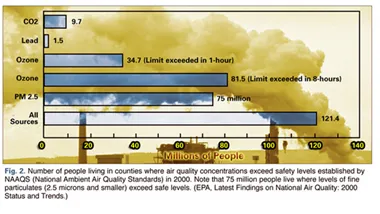
"Some three million deaths a year are linked to
exposure to outdoor air pollution," the UN body
said in the report, which was based on data from 3,000
sites across the world. "Indoor air pollution can
be just as deadly. In 2012, an estimated 6.5 million
deaths (11.6 percent of all global deaths) were associated
with indoor and outdoor air pollution together." According
to WHO, almost all of the air pollution-related deaths
are due to non-communicable diseases, such cardiovascular
illnesses, stroke, chronic obstructive pulmonary disease
and lung cancer.
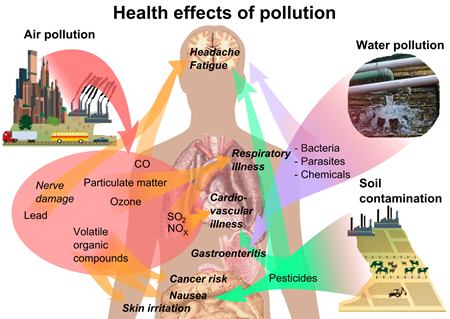
And 90 percent of the deaths reportedly occured in low
and middle-income countries, with nearly two-thirds of
them occurring in WHO's Southeast Asia and Western Pacific
regions."Air pollution continues take a toll on
the health of the most vulnerable populations - women,
children and the older adults," said Flavia Bustreo,
assistant director general at WHO.The problem is most
acute in cities, but air in rural areas is worse than
many think, WHO experts said.Pollution "affects
practically all countries in the world and all parts
of society", Maria Neira, head of the WHO's department
of health and environment, said.
"Fast action to tackle air pollution can't come
soon enough," she added, urging governments to cut
the number of vehicles on the road, improve waste management
and promote clean cooking fuel."Solutions exist
with sustainable transport in cities, solid waste management,
access to clean household fuels and cook-stoves, as well
as renewable energies and industrial emissions reductions."

In March, the UN released a report saying that 80 percent
of city dwellers across the world were breathing poor
quality air, noting that only two percent of cities in
low and middle-income countries had air which met the
UN body's standards. "Urban air pollution continues
to rise at an alarming rate, wreaking havoc on human
health," Neira said. Source: Al
Jazeera News And Agencies
Air Pollution Rates Are on the Rise Around the World,
some video examples
China
India
USA
State
of the Air
Los Angeles area leads in ground ozone pollution, but
it’s also fifth in both short- and long-term particle
pollution. Leading the board among the worst air quality
are Fresno, Madera, Bakersfield, Modesto, and Hanford,
all in the Central Valley.
"All types of electronic
gadgets, from high tension power lines to microwave
ovens, hair dryers, air conditioners, furnaces,
and so forth, almost always emit positive ions.
Then there are the vehicles we drive and ride
in - - the exhaust fumes from cars, trucks, buses,
subways, and airplanes generate unbelievable
tons of positive ions which poison the very air
we breathe."
John Heinerman, Ph.D. |
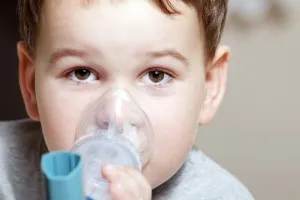
Deadly Effects
of Breathing Polluted Air
"Poor air quality has long been linked to lung
and heart problems, including coronary artery disease,
emphysema, respiratory infections, stroke, and cancer.
It also is especially dangerous for pregnant women, as
it can contribute to birth defects.Air pollution can
also exacerbate numerous conditions, including asthma,
chronic obstructive pulmonary disease (COPD), cardiovascular
disease, and diabetes. Children and the elderly are especially
sensitive to air pollution.
The World Health Organization
says air pollution is the world’s largest environmental
health risk, as it killed an estimated
7 million people in 2012 alone. The vast majority
of those deaths were due to cardiovascular diseases,
namely stroke and ischemic heart disease. Of those,
3.3 million deaths were linked to indoor air pollution." Source
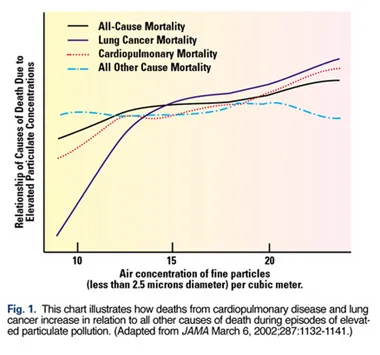
Air Quality Is Worse,
Not Better
Air pollution across the world is getting worse, is
missing targets for safe levels and is putting the lives
and health of millions at risk – figures from the
World Health Organisation (WHO) show. A reliance on fossil
fuels, the use of private cars and buildings which use
energy inefficiently can all be blamed for the deterioration
of outdoor air quality. In announcing new figures on
the state of air quality in cities, WHO has said half
of the urban population monitored for air pollution are
exposed to levels 2.5 times higher than recommended.
"There's no doubt that
air pollution has a detrimental effect on the
skin. It's been scientifically proven to be one
of the main sources
of skin damage; toxins in the air cause skin
to age prematurely, especially
on the face, neck and hands. It's important to
recognise the problem, identify the danger signs
and look at simple ways to either prevent, or
at least minimise, damage." |
Your Indoor
Air Is Likely More Polluted Than Outside
Research has revealed that Americans spend
about 90 percent of their time indoors. So, for most
people, the air pollutants most likely to affect them
are the ones that they will encounter in their own homes
and places of business.Indoor air pollution may be as
much or more of a problem as pollution outdoors, according
to new research. Smoke, fungal
spores, and chemicals used in certain paints, varnishes
and cleaners have been shown to be harmful to human health
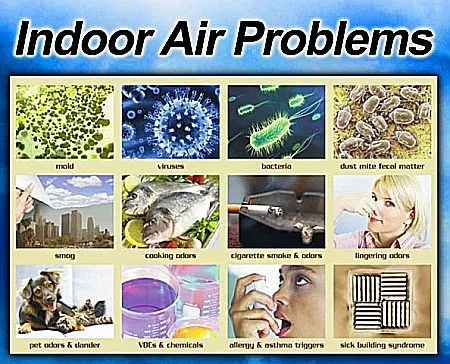
Indoor
pollutants in dust and air are often generated
from tobacco smoke, building materials, furniture,
cleaning and hygiene products, air fresheners, computers,
printers, cooking ect... Building materials and home
furnishings release gasses containing volatile
organic compounds (VOCs) that
have both short- and long-term health effects. Concentrations
of these chemicals are often
up to 10 times higher indoors than they are outdoors.Source
"As
an environmental chemist, I can honestly tell you
that most people don't realize just how bad their
indoor air quality is,
since they don't realize just how many items in their home are contributing
to it"
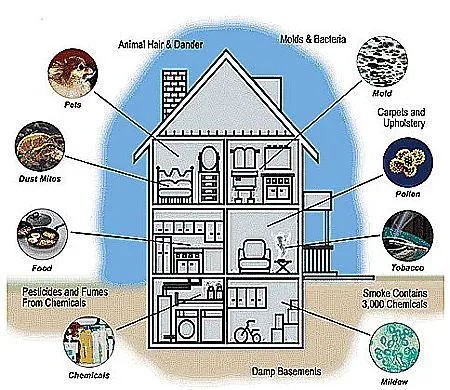
How can you
recognize bad indoor air?
Some health effects can be symptoms of
an air quality problem, especially if they appear after
you move to a new residence, remodel or refurnish a home,
or treat your home with pesticides. If you think you
have symptoms that could be related to your home environment,
consult your doctor or your local health department.
What symptoms
are often linked to poor indoor air quality? It
is common for people to report one or more of the
following symptoms:
Dryness and irritation of the eyes, nose, throat, and
skin
Headache
Fatigue
Shortness of breath
Hypersensitivity and allergies
Sinus congestion
Coughing and sneezing
Dizziness
Nausea
Source
Negative ions are beneficial
to human body in many ways:

 Strengthen
the functions of autonomic nerves Strengthen
the functions of autonomic nerves
 Reinforces
collagen (tissues that are resilient and tension-related) Reinforces
collagen (tissues that are resilient and tension-related)
 Improves
the permeability of the cell's prototype plasma membranes (improves
metabolism) Improves
the permeability of the cell's prototype plasma membranes (improves
metabolism)
 Strengthens
the body's immune system Strengthens
the body's immune system
(Note: Mitochondria can be called the "powerhouse" of the cell.
Most living organisms use food and oxygen to make ATP/energy in a process
called cellular respiration. Most of cellular respiration takes place
inside the mitochondria)
 facilitating
liver cell function facilitating
liver cell function
 increasing
brain power increasing
brain power
 boosting
our mood and immune system boosting
our mood and immune system
 shortening
healing time of flesh wounds and ulcers shortening
healing time of flesh wounds and ulcers
 alleviating
some of the symptoms of bronchial asthma alleviating
some of the symptoms of bronchial asthma
 Negative
ions neutralize pollutants and provide positive effects on health
to Negative
ions neutralize pollutants and provide positive effects on health
to
 Stimulate
the reticulo-endothelial system, a group of defense cells in
our bodies that marshal our resistance to disease Stimulate
the reticulo-endothelial system, a group of defense cells in
our bodies that marshal our resistance to disease
 Act
on our capacity to absorb and utilize oxygen. Negative ions in
the bloodstream accelerate the delivery of oxygen to our cells
and tissues Act
on our capacity to absorb and utilize oxygen. Negative ions in
the bloodstream accelerate the delivery of oxygen to our cells
and tissues
 Speed
up oxidation of serotonin (5-hydroxtryptamine) in the blood.
This is well known to have far reaching effects on mood, pain
relief and sexual drive. Speed
up oxidation of serotonin (5-hydroxtryptamine) in the blood.
This is well known to have far reaching effects on mood, pain
relief and sexual drive.
 Recovery
from physical exhaustion or fatigue - by increasing oxygen levels
in the blood and facilitating more efficient oxygen utilization,
negative ions Recovery
from physical exhaustion or fatigue - by increasing oxygen levels
in the blood and facilitating more efficient oxygen utilization,
negative ions  help
accelerate recovery from fatigue. help
accelerate recovery from fatigue.
 Stabilizing
brain function - by promoting abundant oxygen levels in the blood,
negative ions help normalize brain function, resulting in relaxation
and calmness. Stabilizing
brain function - by promoting abundant oxygen levels in the blood,
negative ions help normalize brain function, resulting in relaxation
and calmness.
 Blood
purification - by increasing the levels of calcium and sodium
in the blood stream, negative ions help restore a healthy (slightly
alkaline) pH balance to the blood. Blood
purification - by increasing the levels of calcium and sodium
in the blood stream, negative ions help restore a healthy (slightly
alkaline) pH balance to the blood.
 Increasing
metabolism - by stimulating the exchange of electronic substances
in cell walls, negative ions help increase metabolism. Increasing
metabolism - by stimulating the exchange of electronic substances
in cell walls, negative ions help increase metabolism.
 Strengthening
the immune system - high levels of negative ions promote production
of globulin in the blood, resulting in stronger resistance to
illness. Strengthening
the immune system - high levels of negative ions promote production
of globulin in the blood, resulting in stronger resistance to
illness.
 Balancing
the autonomic nervous system - negative ions can calm and relax
taut nerves by balancing the opposing sympathetic and parasympathetic
branches of the autonomic nervous system. Balancing
the autonomic nervous system - negative ions can calm and relax
taut nerves by balancing the opposing sympathetic and parasympathetic
branches of the autonomic nervous system.
 Promoting
better digestion - by counteracting over-arousal of the sympathetic
nervous system, negative ions help ease tension in the stomach
and intestines, promoting the production of digestive enzymes
and enhancing digestion. Promoting
better digestion - by counteracting over-arousal of the sympathetic
nervous system, negative ions help ease tension in the stomach
and intestines, promoting the production of digestive enzymes
and enhancing digestion.
 Cell
rejuvenation - negative ions help revitalize cell metabolism,
enhancing the vitality of muscle tissue and strengthening internal
organs. Cell
rejuvenation - negative ions help revitalize cell metabolism,
enhancing the vitality of muscle tissue and strengthening internal
organs.
 For
overall health - negative ions can rejuvenate and revitalize
all of the body's systems and cells, promoting a stronger
overall constitution. For
overall health - negative ions can rejuvenate and revitalize
all of the body's systems and cells, promoting a stronger
overall constitution.

What Can
You Do to Improve Your Air Quality?
Experiments by Dr. Albert P. Krueger and
Dr. Richard F. Smith at the University of California
have shown how ionization affects those sensitive to
airborne allergens. Our bronchial tubes and trachea,
or windpipe, are lined with tiny filaments called cilia.
The cilia normally maintain a whip like motion of about
900 beats a minute. Together with mucus, they keep our
air passages free of dust and pollen. Krueger and Smith
exposed tracheal tissue to negative ions, found that
the ciliary beat was speeded up 1200 a minute and that
mucus flow was increased. Doses of positive ions produced
the opposite effect: ciliary beat slowed to 600 a minute
or less; the flow of mucus dropped.
OF MAJOR
SIGNIFICANCE TO YOUR HEALTH IS THE AIR YOU BREATHE

| |
Negative
Ions |
Positive
Ions |
Blood
vessels |
Dilate
blood vessels |
Constrict
blood vessels |
Blood
Pressure |
Stabilize
BP |
Increase
BP |
Blood |
Increase
blood alkalinity |
Increase
blood acidity |
Bones |
Strengthen
bones |
Weaken
bones |
Urinary
tract |
Promote
urination;
increase nitrogen in urine |
Suppress
urination;
decrease nitrogen in urine |
Respiratory |
Stabilize
respiration and make breathing easier |
Accelerate
respiration and make breathing more difficult. |
Pulse
rate |
Decrease
pulse rate |
Increase
pulse rate |
Heart |
Enhance
heart function |
Impair
heart function |
Fatigue |
Speed
physical recovery |
Prolong
physical recovery |
Autonomic
Nervous System |
Calm
and relax nerves |
Tense
and strain the nervous system |
Growth |
Promote
healthy growth |
Suppress
and delay growth |
"Remember that feeling you've experienced
near a waterfall or high in the mountains? Those are
two places that thousands of negative ions occur. They
create an effect on human biochemistry."
" The normal Ion count in fresh country air is 2,000 to 4,000 negative Ions
per cubic centimeter (about the size of a sugar cube). At Yosemite Falls, you'll
experience over 100,000 negative Ions per cubic centimeter. On the other hand,
the level is far below 100 per cubic centimeter on the Los Angeles freeways during
rush hour."
Researchers believe that through control
of the electrical charges in the air we breathe, our
moods, energy and health can be markedly improved.
Falling barometric pressure and hot, dry,
seasonal winds, such as the Alpine Fohn and the Rocky
Mountain Chinook, for example, pack the air with an excess
of positive ions. Not everyone is affected; healthy young
people swiftly adapt to the change. But countless others
are distressed. The aged come down with respiratory complaints,
aching joints; asthma sufferers wheeze and gasp; children
grow cranky and perverse; crime and suicide rates climb.
One sweltering day in Philadelphia this
summer a man sat before a small metal box resting atop
a hospital file cabinet. It was plugged into an ordinary
wall socket. A doctor flipped a switch. Inside the box
a small fan whirred; the box hummed distantly, like a
high-tension wire, and gave off a faint, sweetish odor.
Soon the man felt alert, magical, refreshed, as though
he had been taking deep gulps of sparkling October air.
The doctor turned the machine off, switched on another
that looked just like it. The air grew quickly stale.
The man's head felt stuffy. His eyes smarted. His head
began to ache. He felt vaguely depressed and tired. With
this simple experiment, the scientist, Dr. Igho H. Kornblueh,
of the American institute of Medical Climatology, demonstrated
the effect that atmospheric ions can have on human beings. The
first machine generated negative ions; the
second positive ions.
Negative
ions can have a positive effect on
people.
But positive ions can have
a negative effect on people.
| DALLAS, June 12 – As few as two hours
after being inhaled, tiny, invisible air pollutants
can penetrate the lungs’ natural defenses
and may trigger a heart attack, according to a
report in today’s Circulation: Journal of
the American Heart Association.
“ Studies of hospital admissions and
emergency department visits have linked exposure
to particulate air pollution with increased
risk of cardiovascular diseases,” says
study author Murray A. Mittleman, M.D., Dr.PH.,
director of cardiovascular epidemiology at
Boston’s Beth Israel Deaconess Medical
Center. “But the current study is the
first to examine short-term transient effects
of air pollution on the risk of heart attack.” Source |
On the other hand, a preponderance of negative
ions spices the air with exhilarating freshness. We feel
on top of the world. Dr. C. W. Hansell, research fellow
at RCA Laboratories and an international authority on
ionization, illustrates the effect with a story about
his ten-year-old daughter. "We were outside, watching
the approach of a thunderstorm. I knew that clouds of
negative ions were filling the air. Suddenly my daughter
began to dance across the grass, a radiant look in her
face. She leaped up on a low boulder, threw her arms
wide to the dark sky, and cried. 'Oh, I feel wonderful!'"
We still have much to learn about atmospheric
ions . But researches believe that these magic bits of
electricity, under artificial control, will soon be helping
millions to healthier, happier, more productive lives...
Max Galka is a data scientist
who keeps two air purifiers in his 600-square-foot
apartment in New York City.
“A good air purifier
costs only a few hundred dollars. So for a
health risk as serious as air pollution, I
think it makes sense for everyone to have one
in the home,” he told Healthline. “I
happen to live in the middle of Manhattan,
but I would have one no matter where I lived.”
Galka knows the risks of air
pollution because he’s studied the data
himself. He says if early deaths were counted
together, air pollution would be the third
leading cause of death in the United States
and the world. Source |
You spend the majority of your time indoors, where you
face significant health risks due to repeated exposure
to air pollutants in your homes, offices, schools and
other indoor environments. Exposure to these pollutants
can lead to numerous immediate and long-term health problems.
| |
|
|
High
Quality Water Ozonater Back in stock now with
Negative Ion Generator
Freshly ozonated water, consumed within 10 minutes
of making it, will boost your entire immune system,
because the extra molecule of oxygen is still
in the water, and available for your body to
absorb
Water Ozonator More
|
| |
|
|
Oxygen meter
Test the Oxygen levels in your immediate enviroment
NEW Oxygen Detector Meter
Portable Oxygen(O2) Concentration Detector
with LCD Display & Sound-light Alarm air quality monitor analyzer
Specifications:
Test : oxygen
Measurement range: 0~25%VOL
Measurement error: ±2%
Resolution: 0.1%
Preheating time: <10 seconds
Response time: <15 seconds
Environmental temperature measurement: -15 ~ 50 Celsius
Alarm mode: sound alarm, light alarm, vibration alarm
Alarm: low concentration 19.5%VOL yellow warning light flashing
High concentration 23.5%VOL red warning lights flashing
(alarm concentration can also be set up)
Continuous working time: 6 hours (with a slight change in the working
state)
Power: 3x1.5V AAA battery(battery is not included)
Audio tip: the higher the frequency of the beep sound, the higher
the concentration is.
Product size: 120*65*25mm
Package includes:
1 x Oxygen O2 Gas Detector(battery is not included)
More information
|
| |
|
|
FingerTip
Oximeter
CE Approved assorted colors
Accurate oxygen saturation and pulse rate data in seconds
Easy to use; automatically turns on/off with finger insertion/removal
Compact size fits easily into a pocket
Description:
Display Method: Color OLED display, two display
directions.
The product is small in size, light in weight (total weight is
about 50g including batteries) and convenient to carry
Power consumption of the product is low and the two originally-equipped
two AAA batteries can be operated continuously for 30 hours
Low Voltage warning will be indicated in Visual window when battery
voltage is so low that normal operation of the oximeter might be
influenced
The product will automatically be powered off when no singnal is
in the product for longer than 8 seconds
The product is suitable for use in family hospital and clinical
, it can be used before or after sports .
|
| |
|
|
Healthcare
CompMist Nebulizer.
Effective CS delivery
Efficient and dependable
Very convenient and easy to use
Includes Length of Tubing, Medication Cup, Mouthpiece and 5 Air
Filters
The CompMist Nebulizer is an effective, efficient
Compressor. It is very easy to use and easy to
clean. At 4 lbs., while it is not one of the
smallest nebulizers available, it is still small
and light enough to carry around and even to
take while traveling. Efficient and dependable
with built-in storage department. For people
looking for a straightforward, simple, effective
nebulizer at a good price, the Mabis Healtcare
CompMist Nebulizer is a good choice
Comes with 220v-240v plus 110v-120v converter
for USA clients
|
| |
|
|

